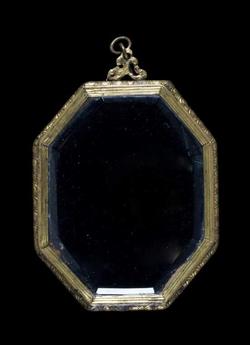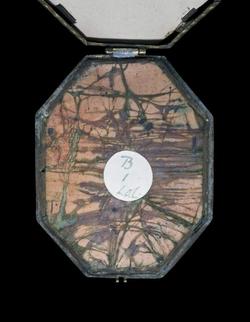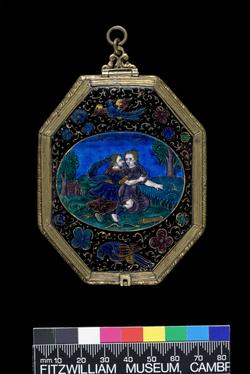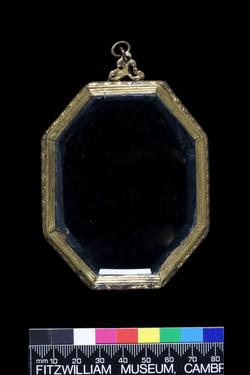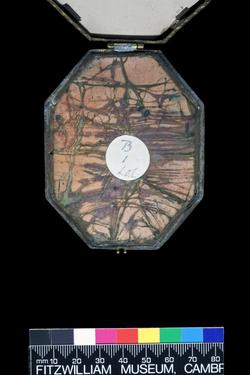Current Location: In storage
Titles
Diana and Callisto
Maker(s)
Maker:
Limosin, François I
(Probably)
Maker:
Limosin, Jean
(Perhaps)
Entities
Categories
Description
Mirror enclosed in a gilt-metal frame with on the exterior a copper plaque decorated with polychrome enamels, partly over foils, and gilded. Jupiter in the form of Diana and Callisto in a landscape.
Elongated octagonal slightly convex copper plaque, decorated in polychrome enamels over foils and and gilded. The central oval medallion has a white ground, decorated in translucent blue, green, turquoise, brownish-yellow, and mulberry enamels over foils, and in pinkish-red, and white enamels for the flesh. The border has a black ground, with motifs in translucent enamels over foils. Gilding, brownish in places, has been applied for outlines or details over both areas. The plaque is mounted in an octagonal gilt-metal frame hinged to another octagonal gilt-metal frame with an egg and dart border enclosing an octagonal bevelled mirror. At the top there is a foliated suspension loop with a ring through it, and another ring through that. decorated in polychrome enamels over foils and and gilded.
Within a horizonal oval medallion Jupiter in the form of Diana embraces Callisto in a landscape. The former wears a mulberry gown with a blue tunic and a blue scarf which billows out behind her. Callisto wears a blue dress which reveals her right leg. Both have wavy brownish-yellow hair drawn back from their brows. A gold bow and a quiver lie on the grass in the foreground. In the background to the right there is a tree on a mound, and to the left, a house beside a tree. The sky is blue. Above and below the panel there is a bird with blue, and mulberry plumage, flanked by green, mulbery or blue foiled flowers, reserved in a black ground decorated with delicate gold tendrils.
Notes
History note: Probably Christie’s 18 July, 1917, lot 8; bought by Pawsey & Payne, 1 Bury Street, St James Square, London, SW1 for £131 5s. 0d. on behalf of Leonard D. Cunliffe (1860-1937), London and Trelissick, Cornwall.
Legal notes
L.D. Cunliffe Bequest, 1937
Measurements and weight
Depth: 1.2 cm
Acquisition and important dates
Method of acquisition: Bequeathed
(1938-02-15)
by
Cunliffe, Leonard Daneham
Dating
17th Century, Early
Circa
1600
CE
-
1625
CE
Note
Portable mirrors in silver or gilt-metal frames backed by Limoges plaques survive in large numbers. They have octagonal or oval frames with a suspension loop at the top, and are decorated in polychrome enamels, partly over paillons (silver foil), usually with a central medallion surrounded by a border of stylized flowers and birds reserved in a dark manganese-black ground overlaid by gold foliage or rinceaux. There are several formats for these borders. Others have a mythological scene or figures with ornamental surrounds which cover the whole plaque. None of the recorded examples are dated, but on stylistic grounds their manufacture probably extended from the late 1590s to the 1620s.. The only closely datable examples have comparable borders around bust portraits of Louis XIII, or of Anne of Austria, probably made at the time of their marriage in 1615 (See Documentation, Baratte, 2000, and Sotheby's, 19 November, 2007, lot 26). Comparable motifs occur on a rectangular plaque with a portrait of the King apparently some ten years older in the Wallace Collection, which bears the initials IL separated by a fleur de lis, for Jean Limosin (c. 1580-1646).
Ovid tells the story of Jupiter’s deception of Callisto by appearing to her as Diana, and then ravishing her, in Metamorphoses 2, 420-531. Associated with a mirror it might serve as a warning to the owner to beware of deceitful suitors. The figures on the plaque was probably derived from Bernard Salomon’s woodcut illustration of 'Caliston deçue par Jupiter' in La Metamorphose d’Ovide figuree, Lyon (Jean de Tournes), 1557, or the later editions of 1564 or 1583, and might also have been influenced by an engraving by Antonio Tempesta (1555-1630) in Metamorphoseon sive transformationum ovidianarum . . Amsterdam, 1606, pl. 13, which has the direction of the figures transposed. A plaque for a mirror decorated with the same figures is in the Hermitage, St Petersburg. (see Documentation). Another decorated with an earlier moment in the story, Jupiter in the form of Diana appearing to Callisto is in the Victoria and Albert Museum (8421-1863), and one with a later incident, Diana and her companions bathing with Callisto sitting apart because of her loss of virginity is in the Musée municipal de l’Évêché, Limoges.
This plaque has been attributed probably to François I Limosin on account of stylistic resemblance to an oval plaque in the Musée du Louvre, which is initialled FL (see Documentation, Baratte, 2000). It is also closely comparable to three octagonal mirrors attributed to Jean I (or II) Limosin, and one attributed either to him or François Limosin in the James A. de Rothschild collection at Waddesdon Manor (see Documentation, Marcheix, 1977) These are decorated with mythological subjects and have similar flowers and birds reserved in the black background around the scene. Catalogue nos. 36 and 37 are signed I.L., with a fleur de lys between the letters on no. 37.
School or Style
Renaissance
People, subjects and objects depicted
Components of the work
Decoration
composed of
enamel
( translucent blue, green, turquoise, brownish-yellow, and mulberry, and pinkish-white, red, and black)
silver foil
gold
Plaque
composed of
copper
Frame
Height 10.1 cm
Width 7.2 cm
Inscription or legends present
Inscription present: circular paper label; C looks rather like an L
- Text: B/1/L.D.C.
- Location: On back of enamel plaque
- Method of creation: Hand-written in faded black ink
- Type: Label
References and bibliographic entries
Related exhibitions
Identification numbers
Accession number: M.11-1938
Primary reference Number: 139824
Stable URI
Audit data
Created: Saturday 6 August 2011
Updated: Thursday 13 March 2025
Last processed: Wednesday 28 January 2026
Associated departments & institutions
Owner or interested party:
The Fitzwilliam Museum
Associated department:
Applied Arts
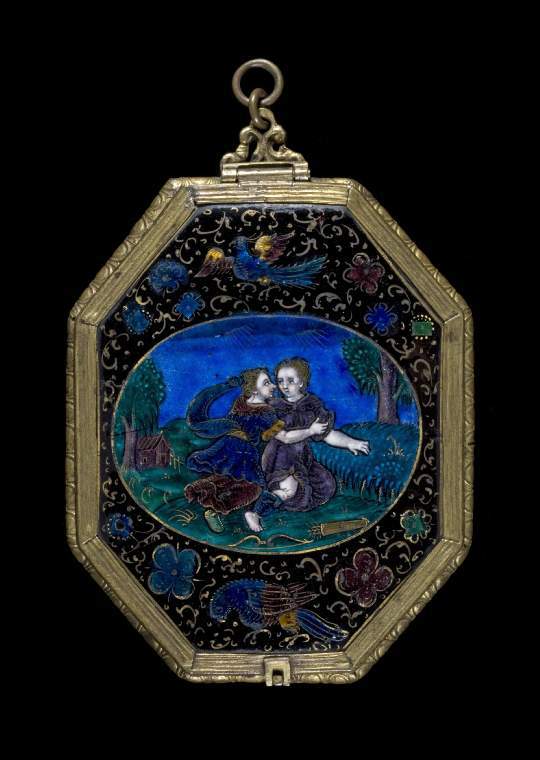
 IIIF Manifest
IIIF Manifest
